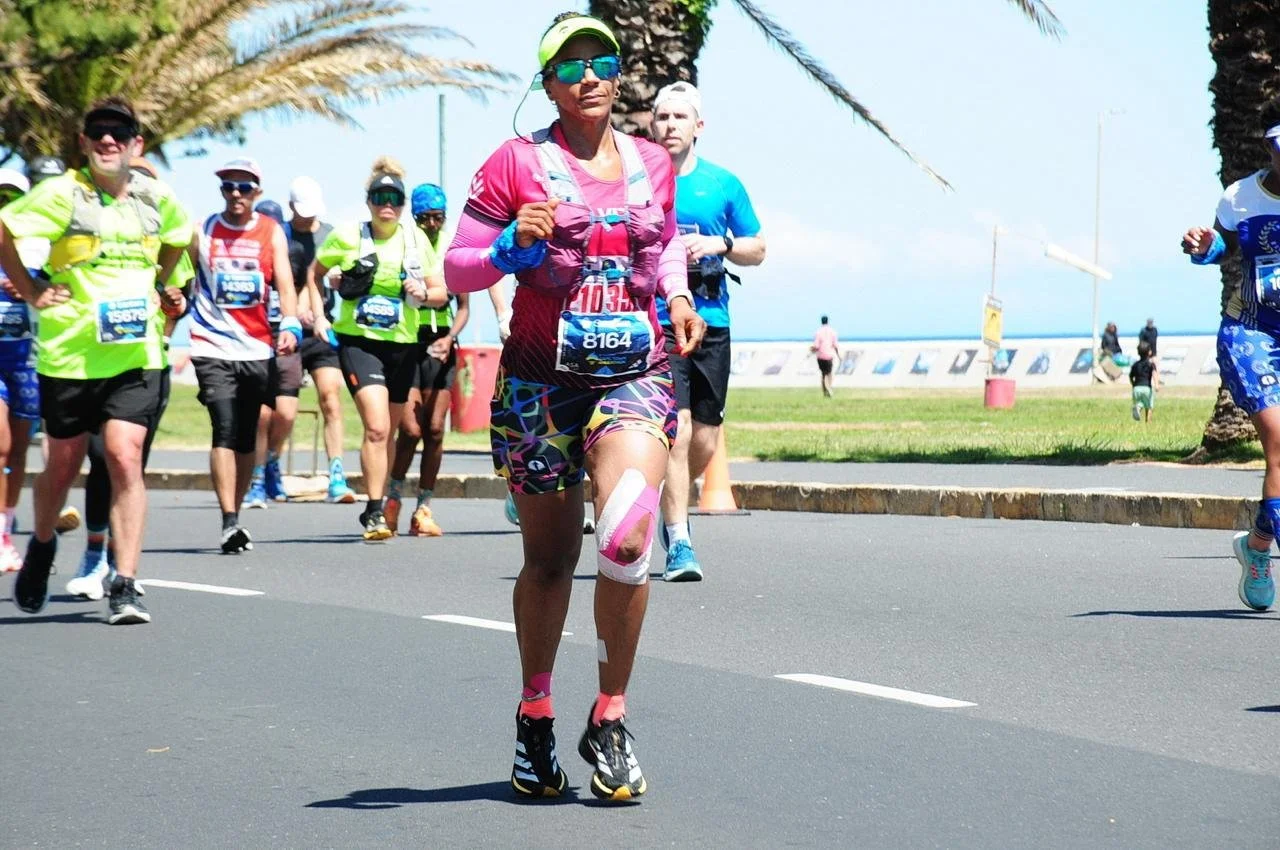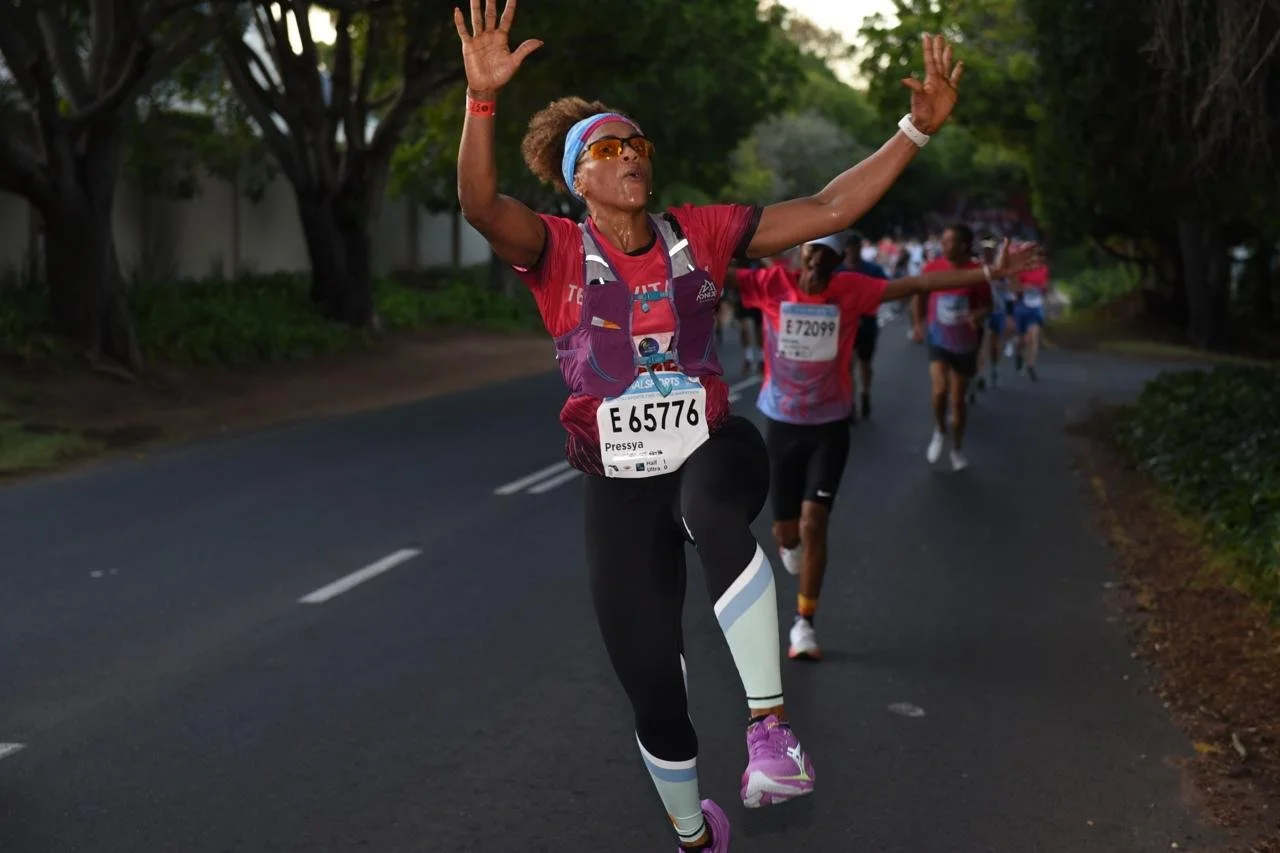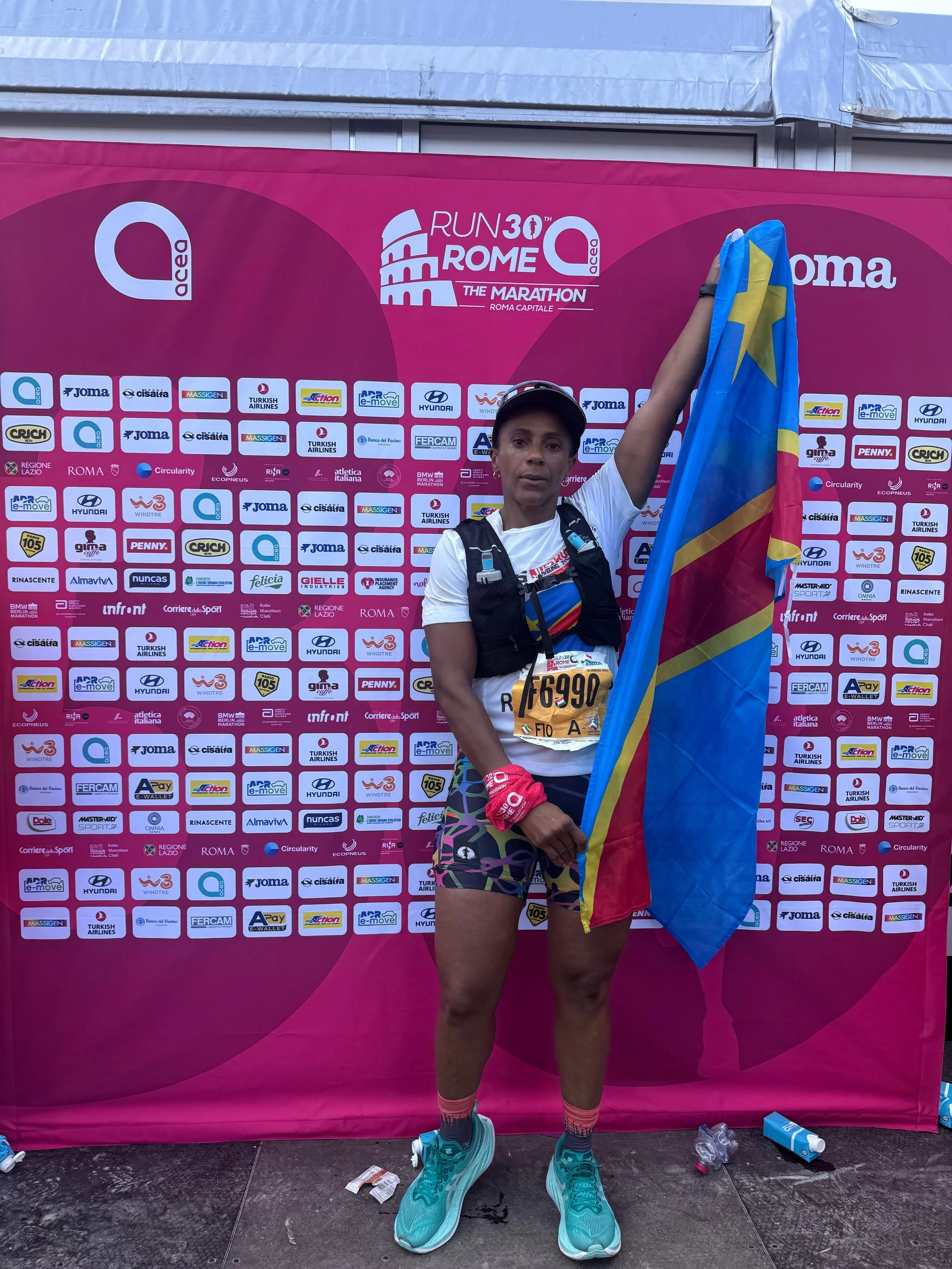“This marathon represents more than a race, it’s a celebration of Congolese resilience, identity, and progress.”
A personal trainer, coach, and marathoner, Pressya Magema Ndongala is the powerhouse behind Woman of Steel, a platform dedicated to empowering women through movement, mindset, and community. From Kinshasa to Rome, she runs with purpose — carrying the flag, breaking barriers, and showing what’s possible when passion meets resilience.
Pressya, your journey blends personal training, coaching, and running. What inspired you to participate in the Congo River Marathon, and how does this event align with your personal and professional aspirations?
As someone who lives outside the country and being exposed to so many races, my inspiration regarding my participation in the CRM is trying to bring the spirit of running here — for people, especially women and young girls — to understand the power behind running, and the beautiful community that it can build. Something we were not exposed to growing up, and it’s time to make a difference for the young generation, as well as direct them into something better than being out partying.
Signing up for the Congo River Marathon is not just about clocking a time — it’s about running with meaning. This marathon represents more than a race route; it’s a celebration of Congolese resilience, identity, and progress. As a coach, personal trainer, and athlete, it felt like the perfect intersection of everything I believe in: using movement to inspire change, foster community, and empower others — especially women.
Participating in this event allows me to show what’s possible when we lead with passion and purpose. It’s a reminder that fitness can be a force for transformation, not just for individuals, but for an entire nation.
Reflecting on your recent marathon experience in Rome, how did that race influence your approach to training and preparation for the Congo River Marathon? What did it mean to represent your country and run with the DRC flag during the race?
Running the Rome Marathon was a pivotal moment. It was my first major international race (when saying international, I am not actually counting all the races done in South Africa as it’s considered as my second home) and I carried the DRC flag with deep pride. Every mile felt like a message: We are here. We are rising, we are strong as a nation, we want to be noticed, because we have the same worth with others.
The experience just added more knowledge to what I know about marathon preparations, which are the importance of listening to my body, fine-tuning my recovery, and building mental endurance. Rome reminded me what I already knew — that marathon training is as much about mindset as it is about mileage. That lesson is now the backbone of my coaching approach for the Congo River Marathon, emphasising strategy, strength, and self-belief.
What’s it like training and running in Kinshasa—the energy, the streets, the challenges? And how does that environment push you as an athlete and coach?
Training in Kinshasa is a challenge and a gift. The city pulses with energy: from the early morning street vendors to the chaos of the traffic, there’s a raw, unfiltered rhythm that keeps you alert, humble, and adaptable. The terrain isn’t always easy, and there are days when the heat, the dust, or the stares make you question your why.
But that’s what makes it powerful. Every session in Kin feels like training with the city itself — its unpredictability, its beauty, and its fight. It pushes me to be more creative as a coach and more resilient as an athlete. And it reminds me that greatness often grows from discomfort.
The CRM community is growing stronger every year. What do you love most about being part of this movement, and what does it mean to represent it as a Congolese woman?
Being part of the Congo River Marathon (CRM) community is one of the most meaningful chapters in my journey. I’ve watched this movement grow, runners showing up with courage, first-timers finding their stride, and communities gathering in support. It’s more than a race. It’s a statement: that Congolese people, especially women, belong in these spaces of strength and visibility.
To represent CRM as a Congolese woman is deeply personal. I carry the weight of history, the dreams of young girls watching from the sidelines, and the fire of a country ready to rise. And I show up not just to run but to lead, to uplift, and to remind us all that movement is a form of freedom.
You’re also a passionate advocate for holistic health. How do you weave nutrition, mindset, and strength training together in your own preparation—and for those you coach?
For me, holistic health means looking beyond the physical — it’s about aligning the body, the mind, and daily habits to work in harmony. Nutrition lays the foundation, mindset keeps you consistent, and strength training builds not only physical power but mental toughness.
In my own routine, I prioritize intentional eating — not strict diets, but fuelling my body with what it needs to thrive. I focus on proteins for muscle recovery, complex carbs for sustained energy, and nutrient-dense foods to support overall well-being.
I believe the mind is the engine behind it all. Consistency and resilience are born from mental discipline, so I approach mindset like a daily practice. Whether it’s journaling, visualisation, or breathwork, I use tools that help me and those I coach stay grounded and focused.
Strength training brings it all together. It builds more than muscle — it teaches structure, self-belief, and patience. I customise each client’s program to match their life and goals, always incorporating mindset and recovery, because real transformation happens when everything is aligned.
How do you envision the role of running and fitness in shaping the future of the DRC, particularly in terms of health, community engagement, and youth development?
Running and fitness can be powerful tools for transformation in the DRC. On a health level, they offer a proactive way to combat lifestyle-related illnesses and promote mental well-being. But beyond health, movement creates connection. Group runs, community events, and training programs bring people together across ages, backgrounds, and beliefs.
For youth especially, fitness provides structure, purpose, and a positive outlet. It teaches discipline, builds confidence, and opens doors — whether through sports scholarships, leadership opportunities, or simply by showing them what’s possible. The ripple effect of investing in physical health and movement could reshape not just individual lives, but entire communities across the country.
As the powerhouse behind Woman of Steel, how do you use your platform to empower and uplift women — both on the track and in daily life?
Woman of Steel is about more than just physical strength — it’s about emotional resilience, self-worth, and reclaiming your power. Through the platform, I share not just training programs, but mindset tools, real stories, and open conversations around what it means to be strong in every sense of the word.
Whether I’m coaching someone for running, overall fitness, shaping the body, HIIT training, mentoring a young woman, or hosting workshops, the goal is always the same: to help women see their value, own their space, and know that strength looks different for everyone. On the track, it might be pushing a new pace. In daily life, it could be setting boundaries, healing, or chasing a goal that once felt impossible.
For young girls in the DR Congo who may be hesitant to start running or training, what message would you share with them?
I’d tell them this: You don’t have to be the fastest or the strongest to start — you just have to start. Running isn’t about proving something to the world; it’s about discovering something within yourself. Every step you take is a step toward confidence, freedom, and self-respect.
You belong in every space you’re willing to show up in. Don’t wait for permission — your journey matters, and you’re allowed to take up space, to sweat, to grow, and to rise. You are more capable than you think, and you’re never alone in the process.
Is there anything else you’d like to share with our readers?
In addition to my work as a coach and athlete, I’m also a qualified massage therapist with a strong focus on sports massage therapy. I specialize in working with athletes, runners, and individuals engaged in regular physical activity — offering both pre- and post-event treatments to enhance performance, support recovery, and reduce the risk of injury.
My expertise includes sports injury management, injury prevention, and muscle recovery through targeted techniques that promote mobility, circulation, and relaxation. I combine the intuitive power of hands-on therapy with advanced tools like NormaTec compression systems and the Hyperice heat + percussion massage gun, delivering a holistic, personalized recovery experience for every client.
It’s all about creating a balanced ecosystem where performance, recovery, and well-being work together — whether you’re chasing a personal best or simply moving for joy.
Follow Pressya’s journey on instagram @wos.fitness.



